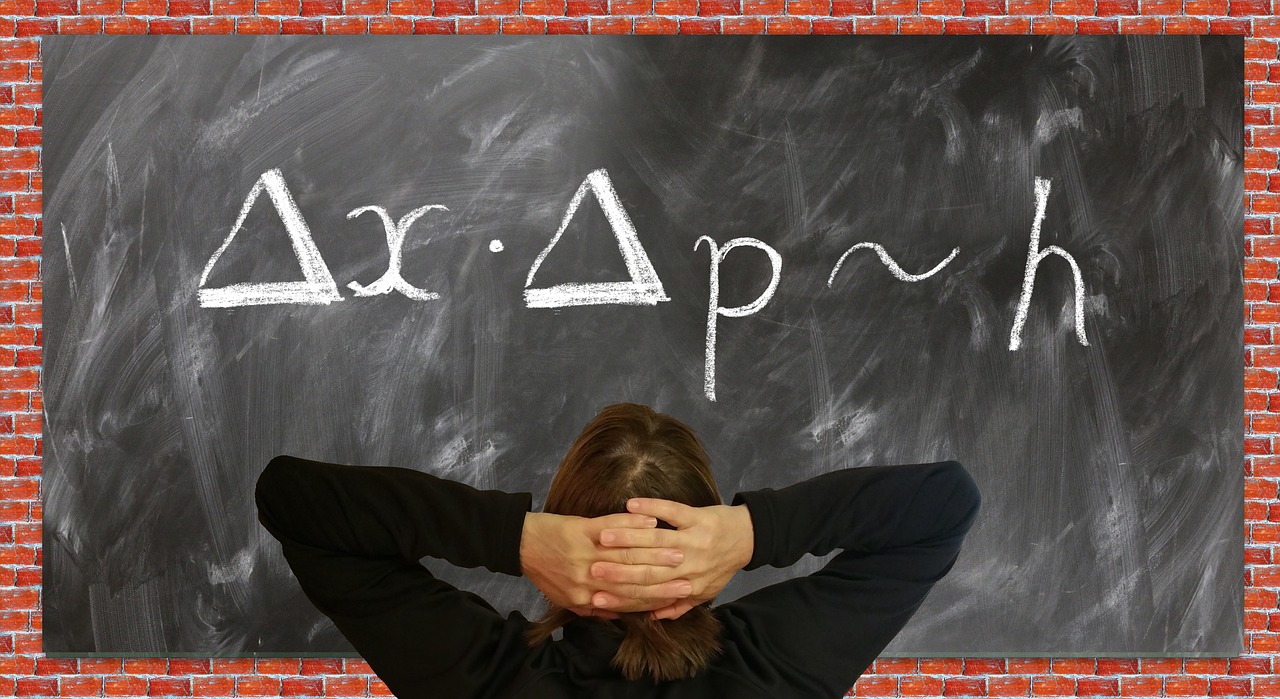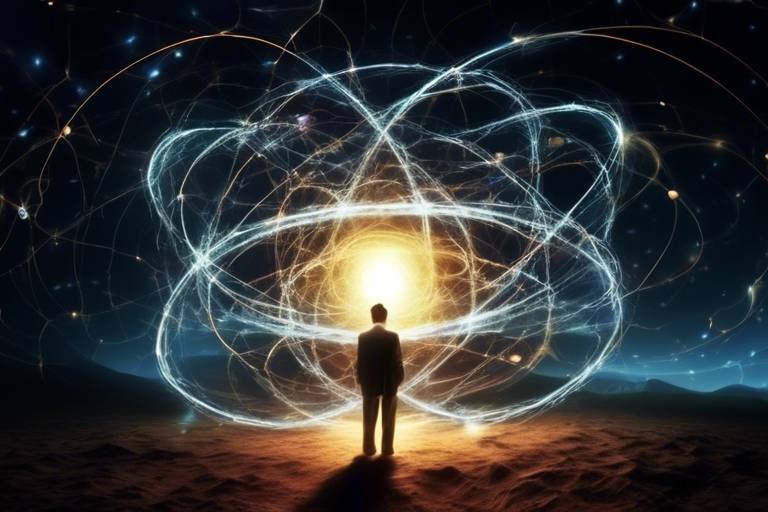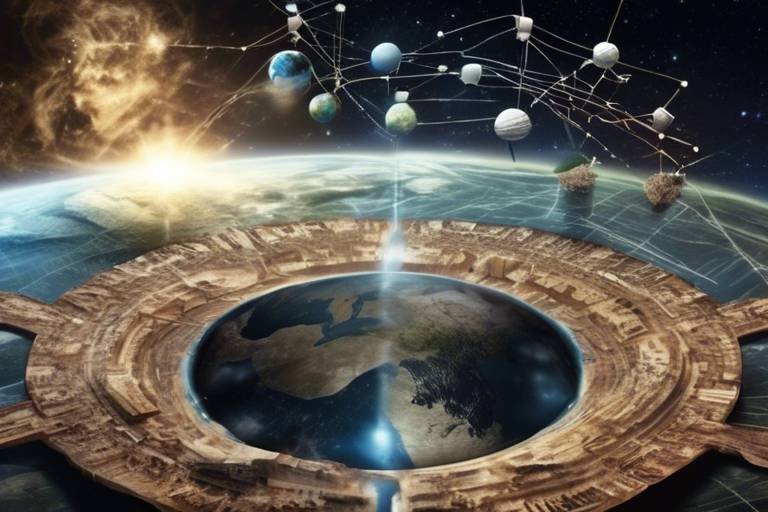The Metaphysical Aspects of Science
This article explores the interplay between science and metaphysics, examining how philosophical concepts influence scientific inquiry and understanding, and the implications for our perception of reality.
When we think about reality, what comes to mind? Is it the tangible world we can touch, see, and measure, or is it something deeper, something that transcends our senses? The nature of reality has been a hot topic for philosophers, scientists, and curious minds alike. With each scientific breakthrough, our understanding of existence evolves. For instance, the development of theories like relativity and quantum mechanics has not only reshaped our scientific landscape but has also challenged our fundamental beliefs about what is real. In this section, we will delve into various philosophical interpretations of reality, exploring how scientific theories shape our understanding of the universe's fundamental nature.
Scientific paradigms serve as the frameworks within which we interpret data and develop theories. They are the lenses through which we view the universe, and they often reflect deeper metaphysical assumptions. For instance, Newtonian mechanics, which dominated scientific thought for centuries, is based on a deterministic view of the universe. This means that if we know the initial conditions of a system, we can predict its future with absolute certainty. But what does this say about our human experience? Are we merely puppets in a cosmic play, or do we possess the ability to influence our destinies? This brings us to a fascinating tension between determinism and free will.
Newton's laws of motion and universal gravitation laid the groundwork for classical physics. However, they also brought forth significant metaphysical implications. The determinism inherent in Newtonian mechanics suggests a universe governed by strict laws, where every action has a predictable reaction. But this deterministic view raises profound questions about human agency. Can we truly claim to have free will if our choices are merely the result of prior causes? This tension is a classic philosophical quandary that continues to spark debate.
In grappling with the conflict between determinism and free will, we find ourselves at a crossroads of thought. Some argue that our choices are predetermined by a complex web of physical laws, while others assert that we possess the ability to choose differently. This debate is not just an academic exercise; it has real-world implications for how we view responsibility, morality, and our place in the universe. Much like a chess game, where every move is influenced by previous ones, our lives may be a series of calculated responses to the environment around us.
Another fascinating aspect of Newtonian mechanics is its definitions of space and time. Newton proposed that space is an absolute entity and time flows uniformly, independent of events. However, these notions have been challenged by modern physics. The implications of these definitions extend beyond the scientific realm, influencing metaphysical discussions about the nature of the universe. If space and time are not absolute, what does that mean for our understanding of existence? It's as if we are trying to solve a cosmic puzzle, where the pieces keep changing shape.
Enter quantum mechanics, a realm where the rules of the game shift dramatically. Here, the act of observation plays a crucial role in determining the state of a system. This leads to intriguing metaphysical questions: What is the nature of reality if it can be altered by our observation? Consider the famous thought experiment of Schrödinger's cat, where a cat in a box is simultaneously alive and dead until observed. This paradox challenges our conventional understanding of existence and reality, suggesting that perhaps consciousness itself plays a fundamental role in shaping our universe.
Observation is not just a passive act; it is an active participant in the unfolding of reality. In scientific experiments, the observer effect illustrates how the mere act of measuring can influence the outcome. It's akin to a butterfly flapping its wings and causing a hurricane on the other side of the world. This raises philosophical implications: if our observations can alter reality, what does that say about our understanding of the universe? Are we co-creators of our reality, or merely spectators?
The observer effect in quantum physics reveals that measurement alters the state of a system. When we attempt to measure a particle's position, we inevitably disturb its momentum. This interplay between observer and observed suggests that reality is not a fixed entity but a dynamic dance influenced by our consciousness. It leads us to ponder: does our awareness shape the fabric of reality? It’s a question that invites us to explore the very essence of existence.
As we venture deeper into the relationship between consciousness and reality, we find ourselves questioning whether consciousness is merely a byproduct of brain activity or a fundamental aspect of the universe. Some theories propose that consciousness is woven into the very fabric of reality, suggesting that our thoughts and perceptions might play a crucial role in shaping the universe around us. This notion challenges us to rethink our understanding of existence and our place within it.
The discoveries of science are not just about uncovering facts; they carry profound philosophical implications that challenge or reinforce our metaphysical beliefs. As we explore the boundaries of scientific knowledge, we must confront the questions that arise about existence and knowledge itself. What does it mean to know something? Is knowledge merely a collection of facts, or is it a deeper understanding of our place in the cosmos?
The debate between scientific realism and anti-realism highlights differing views on the existence of unobservable entities and the nature of scientific truth. Scientific realists argue that scientific theories accurately describe an objective reality, while anti-realists contend that theories are merely useful tools for predicting observations. This philosophical divide invites us to reconsider the nature of truth and existence, prompting us to ask: what is real?
Finally, it is essential to recognize how metaphysical assumptions underpin scientific discourse. These assumptions influence the interpretation and acceptance of scientific theories, shaping our understanding of the universe. As we navigate the intricate relationship between science and metaphysics, we uncover a rich tapestry of ideas that challenge us to think critically about the nature of reality.
- What is the relationship between science and metaphysics? Science seeks to understand the natural world through observation and experimentation, while metaphysics explores the fundamental nature of reality beyond empirical evidence.
- How do scientific paradigms influence our understanding of reality? Scientific paradigms provide frameworks that shape our interpretations of data and theories, often reflecting deeper metaphysical assumptions about existence.
- What are the implications of the observer effect in quantum mechanics? The observer effect suggests that the act of measurement can alter the state of a system, raising questions about the nature of reality and the role of consciousness.
- How do philosophical debates impact scientific discourse? Philosophical debates, such as scientific realism vs. anti-realism, influence how scientific theories are interpreted and accepted, shaping our understanding of knowledge and existence.

The Nature of Reality
The concept of reality is as complex as it is fascinating. At its core, reality encompasses everything we perceive, understand, and perhaps even what we cannot comprehend. Philosophers and scientists alike have wrestled with the question: What is the true nature of reality? Is it merely a construct of our minds, or does it exist independently of our perceptions? This exploration leads us down various philosophical paths, each offering unique insights into the fabric of existence.
One prominent philosophical interpretation is idealism, which posits that reality is fundamentally mental or immaterial. According to this view, what we perceive as the physical world is just a manifestation of our consciousness. This perspective can be likened to a dream, where the dreamer creates a world that feels real, yet it exists solely within the confines of the mind. On the other hand, materialism argues that reality is composed of tangible matter and physical laws, suggesting that our thoughts and consciousness arise from complex interactions of physical particles. This dichotomy raises questions about the validity of our experiences and the nature of existence itself.
As we dive deeper into scientific theories, we find that they often reflect these philosophical interpretations. For instance, the theory of relativity revolutionized our understanding of space and time, suggesting that they are not absolute but rather relative to the observer's state of motion. This idea challenges our conventional notions of reality, prompting us to consider how our perceptions shape our understanding of the universe. Similarly, quantum mechanics introduces a layer of complexity by implying that particles exist in a state of probability until observed, further blurring the lines between reality and perception.
To illustrate the interplay between scientific theories and philosophical interpretations, consider the following table that summarizes key concepts:
| Philosophical View | Scientific Theory | Key Implications |
|---|---|---|
| Idealism | Quantum Mechanics | Reality is influenced by observation, suggesting consciousness plays a role in shaping existence. |
| Materialism | Newtonian Physics | Reality is objective and can be understood through physical laws, independent of perception. |
| Relativism | Theory of Relativity | Space and time are relative, challenging the notion of absolute reality. |
As we navigate these philosophical waters, it becomes clear that our understanding of reality is not static; it evolves as we make new discoveries and challenge old assumptions. The interplay between science and metaphysics invites us to question our beliefs and encourages a more profound exploration of existence. In this sense, reality is not just what we see around us; it is a dynamic tapestry woven from our thoughts, experiences, and the scientific principles that govern the universe.
In summary, the nature of reality is a rich and intricate subject that invites us to ponder the very essence of existence. It is a conversation that transcends disciplines, bridging the gap between science and philosophy, and urging us to continue exploring the mysteries of our universe.
- What is the difference between reality and perception?
Reality refers to the actual state of things, while perception is how we interpret and understand those things through our senses. - Can science explain everything about reality?
While science provides valuable insights into the physical world, it may not fully capture the subjective aspects of human experience. - How do philosophical views influence scientific inquiry?
Philosophical assumptions can shape the questions scientists ask and the interpretations they make regarding their findings.

Scientific Paradigms
The world of science is not just a collection of facts and figures; it's a complex web of ideas and theories that shape our understanding of the universe. At the heart of this web are scientific paradigms, which are essentially frameworks through which we interpret observations and data. These paradigms are influenced by underlying metaphysical assumptions, which can often go unnoticed but play a crucial role in how we perceive reality. For instance, consider how the transition from Newtonian mechanics to quantum physics not only revolutionized science but also challenged our very notions of existence and causality.
Newtonian mechanics, which dominated the scientific landscape for centuries, is grounded in a deterministic view of the universe. This means that if we know the initial conditions of a system, we can predict its future with absolute certainty. This paradigm reflects a metaphysical assumption that the universe operates like a grand clockwork machine, governed by fixed laws. However, as we delve deeper into the complexities of quantum mechanics, we encounter a very different picture. Here, uncertainty reigns supreme, and the act of measuring a system can fundamentally alter its state. This shift from determinism to probabilistic outcomes raises profound questions about the nature of reality itself.
Newton's laws of motion and universal gravitation laid the groundwork for classical physics, offering a clear and predictable model of the physical world. However, the metaphysical implications of these laws extend far beyond mere calculations. They suggest a universe where everything is interconnected, and every action has a corresponding reaction. This deterministic outlook leads to intriguing philosophical questions about free will. If our actions are merely the result of prior states of the universe, do we truly have agency? This tension between determinism and free will invites us to explore deeper philosophical realms.
The debate between determinism and free will is as old as philosophy itself. In the context of Newtonian mechanics, determinism posits that every event or state of affairs is the outcome of preceding events. This can lead to a rather bleak interpretation of human existence, where our choices are merely illusions. Yet, many argue that human consciousness and experience suggest a level of agency that cannot be easily dismissed. The challenge lies in reconciling these two perspectives—can we find a middle ground where both determinism and free will coexist?
Furthermore, Newton's definitions of space and time have profoundly influenced metaphysical discussions. He viewed space as an absolute entity, a vast stage where events unfold, and time as a linear progression. This framework has shaped not only scientific thought but also our everyday understanding of existence. However, with the advent of Einstein's theory of relativity, these concepts were turned on their head. Space and time became interwoven into a single continuum, suggesting that our perceptions of reality are far more complex than Newtonian physics would lead us to believe.
As we transition into the realm of quantum mechanics, the metaphysical questions become even more intriguing. Here, the act of observation plays a pivotal role in determining the state of a system. This phenomenon challenges the very fabric of reality as we know it. In quantum mechanics, particles exist in a state of superposition, meaning they can be in multiple states at once until observed. This leads to the question: does reality exist independently of our observation, or is it shaped by our consciousness? Such questions blur the lines between science and philosophy, inviting us to reconsider the nature of existence itself.
In conclusion, scientific paradigms are not merely frameworks for understanding the world; they are deeply intertwined with metaphysical assumptions that shape our perception of reality. As we navigate through the complexities of classical and quantum physics, we are reminded that our understanding of existence is an ever-evolving journey. The implications of these paradigms challenge us to question our beliefs, encouraging a dialogue between science and philosophy that enriches our quest for knowledge.
- What is a scientific paradigm? A scientific paradigm is a framework of theories and assumptions that guide scientific inquiry and interpretation of data.
- How do metaphysical assumptions influence science? Metaphysical assumptions shape our understanding of concepts like causality, existence, and reality, which in turn influence scientific theories.
- What is the difference between Newtonian and quantum mechanics? Newtonian mechanics is deterministic, while quantum mechanics introduces uncertainty and the role of observation in defining reality.
- Can determinism and free will coexist? This is a debated topic in philosophy; some argue they can coexist, while others see them as mutually exclusive.
- How has Einstein's theory of relativity changed our understanding of space and time? Einstein's theory interweaves space and time into a single continuum, challenging Newton's absolute concepts.

Newtonian Mechanics
When we dive into the world of , we are stepping into a realm that has profoundly shaped our understanding of the physical universe. Developed by Sir Isaac Newton in the 17th century, this framework laid the groundwork for classical physics and introduced concepts that still resonate in scientific discourse today. Imagine a world where every action has a predictable reaction, where the motion of planets and apples falling from trees can be described with elegant mathematical equations. This is the beauty of Newtonian mechanics, but it also opens the door to some intriguing metaphysical implications.
At its core, Newtonian mechanics operates on a foundation of determinism. This means that if we know the initial conditions of a system—its position, velocity, and forces acting upon it—we can predict its future states with absolute certainty. This predictability raises fascinating questions about the nature of causality. Are we mere puppets in a deterministic universe, where every thought and action is simply the result of preceding events? Or do we possess the ability to influence our destinies, challenging the deterministic view? This tension between determinism and free will is a philosophical debate that has persisted for centuries, and it finds its roots in the principles of Newtonian physics.
The clash between determinism and free will is akin to a dance, where each partner plays a crucial role in the unfolding narrative. On one hand, determinism suggests that our choices are preordained by the laws of nature, much like the predictable path of a projectile launched into the air. On the other hand, the concept of free will invites us to consider the possibility that we can transcend the laws of physics, making choices that are not merely the result of prior states. This philosophical inquiry is not just an academic exercise; it has real implications for how we perceive ourselves and our actions in the world.
Furthermore, Newton's definitions of space and time contributed significantly to metaphysical discussions surrounding the universe. In his view, space was an absolute entity, a stage upon which events occurred, while time flowed uniformly, independent of the events that transpired. This perspective has influenced how we understand the cosmos, leading to the notion of a linear timeline where past, present, and future are distinct and separate. However, as we delve deeper into the realms of modern physics, particularly with the advent of Einstein's theories, we begin to see a shift in this understanding. Space and time are no longer viewed as separate entities but as intertwined dimensions that can bend and warp under the influence of mass and energy.
In summary, Newtonian mechanics not only revolutionized our approach to understanding motion and forces but also posed significant metaphysical questions about the nature of reality itself. As we grapple with the implications of determinism versus free will and reevaluate our understanding of space and time, we find ourselves at the intersection of science and philosophy. This intersection invites us to explore the deeper meanings behind the equations that govern our universe, challenging us to reconsider our place within it.
- What is Newtonian mechanics?
Newtonian mechanics is a branch of classical physics that describes the motion of objects using laws formulated by Sir Isaac Newton, focusing on concepts like force, mass, and acceleration.
- How does determinism relate to Newtonian mechanics?
Determinism in Newtonian mechanics suggests that if we know the initial conditions of a system, we can predict its future states with certainty, raising questions about free will.
- What are the implications of Newton's views on space and time?
Newton viewed space and time as absolute entities, which has influenced our understanding of the universe, though later theories, like Einstein's, have challenged this perspective.

Determinism vs. Free Will
The age-old debate between determinism and free will is not just a philosophical quandary; it has profound implications for how we understand ourselves and our place in the universe. At its core, determinism suggests that every event or action, including human behavior, is the result of preceding events governed by natural laws. This perspective can feel a bit like watching a well-rehearsed play, where every line and action is scripted, leaving little room for improvisation or spontaneity. On the other hand, the idea of free will posits that individuals have the power to make choices independent of any prior causes, akin to a jazz musician improvising a solo, where every note is a reflection of personal expression and creativity.
When we examine the implications of these two viewpoints, we find ourselves standing at a crossroads. If we embrace determinism, we might feel a sense of comfort in understanding that our actions are the outcome of a complex web of previous events. However, this can also lead to a sense of fatalism, where individuals might believe that their choices are merely illusions. In contrast, the belief in free will empowers us, instilling a sense of responsibility for our actions and decisions. It encourages us to see ourselves as the architects of our own destinies, capable of shaping our futures through conscious choices.
To illustrate this dichotomy further, let’s consider a few key points:
- Determinism: Suggests that every action is predetermined by prior states of the universe.
- Free Will: Argues that individuals can make choices unaffected by past events.
- Philosophical Implications: Raises questions about morality, responsibility, and the nature of human agency.
As we navigate through life, the tension between these concepts can lead to significant philosophical inquiries. For instance, if our actions are predetermined, how do we reconcile this with our legal systems that hold individuals accountable for their choices? Conversely, if we accept free will, how do we explain the influence of genetics, upbringing, and environment on our decisions? These questions are not just academic; they resonate deeply in our everyday lives, influencing our beliefs about justice, morality, and personal responsibility.
Moreover, the advent of modern science, particularly in fields like neuroscience, adds layers of complexity to this discussion. Studies suggest that our brains may make decisions before we are consciously aware of them, challenging the very essence of free will. This revelation can feel like a plot twist in a gripping novel, forcing us to reconsider the narrative we tell ourselves about our autonomy.
Ultimately, the interplay between determinism and free will invites us to explore the nature of existence itself. Are we merely players in a cosmic game, or do we hold the power to change the script? This philosophical inquiry is a journey that each of us must undertake, and it shapes not only our understanding of ourselves but also the world around us.
- What is determinism? Determinism is the philosophical belief that all events, including human actions, are determined by preceding events in accordance with the laws of nature.
- What is free will? Free will is the idea that individuals have the ability to make choices that are not determined by prior causes or external circumstances.
- Can determinism and free will coexist? This is a contentious debate among philosophers. Some argue for a compatibilist view, suggesting that free will can exist within a deterministic framework.
- How does neuroscience impact the debate? Neuroscience has shown that decisions may be made subconsciously before we are aware of them, raising questions about the authenticity of free will.

Spatial and Temporal Concepts
When we think about space and time, it’s easy to imagine them as static backdrops to our lives, much like the canvas for a painting. However, in the realm of Newtonian mechanics, these concepts take on a much more dynamic role. Isaac Newton proposed that space is an absolute entity, a vast container in which all objects exist and move. This view suggests that space is not merely a void but a fundamental aspect of reality itself, shaping how we perceive motion and interaction. Similarly, time was seen as a linear progression, a constant flow that ticks away uniformly, regardless of what happens within it. But what if I told you that these ideas have profound implications for our understanding of existence?
Newton's definitions of space and time have not only influenced scientific thought but also sparked extensive philosophical debates. For instance, consider the idea of absolute space versus relative space. Absolute space, as Newton described, is a fixed framework that exists independently of the objects within it. On the other hand, relative space suggests that space is defined by the relationships between objects. This debate raises questions about the very nature of reality: Is space something that exists on its own, or is it merely a construct based on our perceptions and experiences?
Moreover, the implications of Newton's temporal concepts are equally fascinating. The notion of time as a constant and uniform flow has led to the idea of determinism, where every event is the result of preceding causes, much like a perfectly arranged domino effect. This deterministic view can be comforting, as it implies predictability and order in the universe. Yet, it also poses challenging questions about free will. If every action is predetermined by previous states, do we truly have the agency to make choices? Or are we merely players following a script written by the laws of physics?
In contrast, the advent of relativity and subsequent theories in modern physics has radically transformed our understanding of space and time. Albert Einstein's theory of relativity introduced the idea that space and time are interconnected, forming a four-dimensional continuum. This means that the fabric of the universe is not a rigid stage but rather a flexible entity that can warp and bend in response to mass and energy. Imagine a trampoline with a heavy ball placed in the center; the surface dips and creates a curvature that affects how smaller balls roll around it. This analogy illustrates how gravity influences the flow of time and the structure of space, challenging the very foundations of Newtonian thought.
As we delve deeper into these spatial and temporal concepts, we begin to see that our understanding of reality is not just shaped by scientific theories but also by our philosophical interpretations. The interplay between these disciplines invites us to question the essence of existence itself. Are we merely observers in a predetermined universe, or do our thoughts and actions play a fundamental role in shaping reality? The answers to these questions may lie at the intersection of science and metaphysics, where the boundaries between the known and the unknown blur.
In summary, the concepts of space and time as defined by Newton have profound implications not only for our scientific understanding but also for our philosophical perspectives. As we continue to explore these ideas, we must remain open to the possibility that our perceptions of reality are far more intricate than they appear. The journey into the metaphysical dimensions of science is as captivating as it is complex, inviting us to ponder the very fabric of existence.
- What is the difference between absolute and relative space? Absolute space is an independent entity that exists on its own, while relative space is defined by the relationships between objects.
- How do Newton's concepts of space and time influence our understanding of free will? Newton's deterministic view suggests that every action is a result of previous causes, raising questions about our ability to make independent choices.
- What role does Einstein's theory of relativity play in understanding space and time? Einstein's theory revolutionized our view by showing that space and time are interconnected, forming a flexible continuum that can be affected by mass and energy.

Quantum Mechanics
Ah, quantum mechanics! The name alone can send shivers down the spine of even the most seasoned physicist. It’s a realm where the rules of classical physics crumble, and we’re left grappling with concepts that seem to defy our everyday understanding of reality. Imagine a world where particles can exist in multiple states at once, where observing something can change its very nature. This isn’t just science fiction; it’s the bizarre reality of quantum mechanics.
At its core, quantum mechanics challenges our perceptions of existence and the universe. One of the most fascinating aspects is the concept of superposition. In classical terms, we’re used to thinking about objects as being in one state or another—like a light switch that’s either on or off. But in the quantum world, particles can exist in a state of being both on and off at the same time until they are observed. This leads us to a profound question: if reality is shaped by observation, what does that say about the nature of existence?
Another mind-bending aspect of quantum mechanics is entanglement. This phenomenon occurs when particles become intertwined in such a way that the state of one particle can instantaneously affect the state of another, no matter how far apart they are. Imagine having a pair of gloves, one in New York and one in Tokyo. If you put on the glove in New York, you instantly know the status of the glove in Tokyo—whether it’s left or right. In the quantum world, this connection defies the conventional understanding of space and time, raising questions about the very fabric of reality.
To illustrate these concepts further, consider the following
| Concept | Description |
|---|---|
| Superposition | The ability of a quantum system to be in multiple states at once. |
| Entanglement | A phenomenon where particles become interconnected, affecting each other's states instantaneously. |
| Observer Effect | The principle that the act of observation can alter the state of a quantum system. |
These concepts not only challenge our scientific understanding but also plunge us into deep philosophical waters. If our observations can shape reality, what role does consciousness play in this grand scheme? Are we mere observers in a universe that exists independently of us, or are we active participants in the creation of reality? These questions echo through the halls of both science and philosophy, inviting us to ponder the very essence of existence.
As we delve deeper into quantum mechanics, we find ourselves at the intersection of science and metaphysics. The implications of these theories stretch far beyond the laboratory, influencing our thoughts on free will, determinism, and the nature of knowledge itself. In this strange quantum landscape, we are reminded that the universe is not just a collection of particles and forces; it is a complex tapestry woven from the threads of observation, consciousness, and reality.
- What is quantum mechanics? Quantum mechanics is a fundamental theory in physics that describes the behavior of matter and energy at the smallest scales, such as atoms and subatomic particles.
- What is superposition? Superposition is the principle that a quantum system can exist in multiple states at the same time until it is observed.
- What does entanglement mean? Entanglement refers to a phenomenon where two or more particles become linked, such that the state of one particle can instantly influence the state of another, regardless of the distance between them.
- How does observation affect quantum systems? The act of observing a quantum system can change its state, a concept known as the observer effect.

The Role of Observation
When we dive into the world of science, one of the most fascinating aspects we encounter is the role of observation. It’s not just about looking; it’s about how what we see can influence the very fabric of reality itself. Imagine standing at the edge of a vast ocean, where every wave represents a different possibility. Each time you gaze at the water, you change its course, if only slightly. This is the essence of observation in scientific inquiry.
In the realm of physics, particularly quantum mechanics, the act of observing a phenomenon can alter its outcome. This is famously highlighted in the thought experiment known as Schrödinger's cat, where a cat in a box is simultaneously alive and dead until someone opens the box to observe it. This paradox raises profound questions about the nature of reality: Is the cat alive or dead before we look? The answer seems to depend on our act of observation, suggesting that reality is not as fixed as we once thought.
Moreover, the observer effect plays a crucial role in understanding how measurements in quantum physics can change the state of a system. When we measure the position of a particle, we inadvertently disturb its momentum. This interplay between observation and the observed is not just a quirky feature of quantum mechanics; it challenges our traditional views of how we perceive the universe. To put it simply, our very act of watching changes the game.
Consider the implications of this in our daily lives. We often think of ourselves as passive observers of the world around us, but what if our attention actively shapes our experiences? Just like a painter who alters a canvas with every brushstroke, our perceptions can color our understanding of reality. This raises a multitude of questions:
- How much does our consciousness influence the world we see?
- Are we merely witnesses to a reality that exists independently, or are we co-creators of our universe?
- What does this mean for our understanding of truth and knowledge?
As we navigate through these questions, it becomes clear that observation is not just a tool of science; it is a fundamental component of our existence. The implications stretch far beyond the laboratory, touching on philosophy, consciousness, and even spirituality. When we observe, we are engaging in a complex dance with reality, one that invites us to reconsider what we think we know.
In conclusion, the role of observation in science is a powerful reminder of the interconnectedness of all things. It urges us to recognize that our perceptions shape our understanding of the universe. Just as light can illuminate the darkest corners, our observations can reveal truths that were once hidden. So, the next time you find yourself gazing into the unknown, remember that you are not just a spectator; you are an active participant in the unfolding story of reality.
- What is the observer effect in quantum mechanics? The observer effect refers to changes that the act of observation can make on a phenomenon being observed, particularly in quantum systems.
- How does observation influence scientific experiments? Observation can alter the outcomes of experiments, leading to different interpretations of data and results.
- Can consciousness affect reality? There are philosophical debates surrounding this question, with some theories suggesting that consciousness plays a role in shaping our experience of reality.

Observer Effect
The is one of the most intriguing concepts in quantum physics, and it raises profound questions about the nature of reality itself. At its core, the observer effect suggests that the mere act of observation can alter the state of a quantum system. Imagine you're trying to sneak a peek at a magician's trick; the moment you look, the magic changes. In quantum mechanics, this isn't just a metaphor—it's a fundamental principle that challenges our traditional notions of how we perceive and interact with the universe.
To illustrate this, consider the famous double-slit experiment. When particles such as electrons are fired at a barrier with two slits, they create an interference pattern that suggests they are behaving like waves. However, when scientists observe which slit the particles go through, that interference pattern disappears, and they behave like particles instead. This dramatic shift based on observation leaves us pondering: does reality exist independently of our observation, or is it shaped by our consciousness?
The implications of the observer effect extend beyond physics; they seep into our philosophical understanding of existence. If our observation can influence the outcome of an experiment, can we say that reality is objective and fixed? Or is it fluid and contingent, shaped by our perceptions and interactions? This leads us to consider the role of consciousness in defining reality. Are we mere spectators in an unfolding drama, or are we active participants who shape the narrative of existence?
Furthermore, the observer effect invites us to reflect on the limitations of our scientific instruments and methodologies. If we cannot observe a phenomenon without altering it, how do we claim to understand the universe? This paradox challenges the very foundation of scientific inquiry, pushing us to acknowledge that our quest for knowledge is intertwined with the act of observation itself.
In summary, the observer effect serves as a reminder that our understanding of reality is not as straightforward as it may seem. It invites us to explore the intricate relationship between observation, consciousness, and the fundamental nature of existence. As we delve deeper into the mysteries of quantum mechanics, we are left with more questions than answers, challenging us to rethink our place in the cosmos.
- What is the observer effect? The observer effect refers to the phenomenon where the act of observing a quantum system alters its state, leading to different outcomes based on whether or not it is observed.
- Why is the observer effect important? It highlights the complex relationship between observation and reality, suggesting that our perceptions can influence the nature of existence itself.
- Can we trust scientific measurements? While scientific measurements aim to be objective, the observer effect reminds us that our observations can inherently affect the results.
- How does the observer effect relate to consciousness? The observer effect raises questions about whether consciousness plays a fundamental role in shaping reality, suggesting a deeper connection between mind and matter.

Consciousness and Reality
When we talk about consciousness, we dive into a realm that feels both familiar and enigmatic. Have you ever pondered whether your thoughts shape the world around you or if they merely reflect it? This question lies at the heart of the relationship between consciousness and reality. Some philosophers argue that consciousness is not just a passive observer but an active participant in the creation of reality. Can you imagine a world where your awareness influences the physical universe? It sounds like something out of a science fiction novel, yet many scientists and thinkers are exploring this very idea.
One of the most intriguing aspects of this discussion is the concept of idealism, which posits that reality is fundamentally mental. In this view, the universe exists because we perceive it; without consciousness, there would be no reality. This perspective raises profound questions: If reality is a construct of our minds, what happens when we dream? Are dreams mere illusions, or do they reveal deeper truths about our existence? The interplay between waking life and dreams challenges our understanding of what is real, suggesting that consciousness plays a pivotal role in shaping our experiences.
On the flip side, we have materialism, which argues that consciousness arises from physical processes in the brain. From this standpoint, reality exists independently of our perception, and consciousness is simply a byproduct of neural activity. However, this view struggles to explain the subjective nature of experience. How can a collection of neurons generate the rich tapestry of thoughts, emotions, and sensations we experience daily? This dilemma leads us to consider the possibility that consciousness might be more than just a product of the brain; perhaps it is a fundamental aspect of the universe itself.
To further illustrate this complex relationship, let's consider a few key points:
- The Observer Effect: In quantum mechanics, the act of observation influences the state of a system. This phenomenon raises questions about the role of consciousness in shaping reality. Does our awareness alter the fabric of existence?
- Non-locality: Quantum entanglement suggests that particles can be connected regardless of distance. This challenges our conventional understanding of space and time, hinting at a deeper connection between consciousness and the universe.
- Philosophical Implications: If consciousness is integral to reality, it could necessitate a re-evaluation of our metaphysical beliefs. What does it mean for our understanding of existence if our minds can influence the cosmos?
As we explore these ideas, it becomes clear that the relationship between consciousness and reality is not just a philosophical exercise; it has real implications for how we understand our place in the universe. Are we mere spectators in a grand performance, or are we active co-creators of our reality? The answers to these questions may hold the key to unlocking the mysteries of existence itself.
- What is the relationship between consciousness and reality?
Consciousness may actively shape reality, suggesting that our awareness influences the physical universe. - Can dreams reveal truths about our existence?
Many believe that dreams can provide insights into our subconscious and challenge our understanding of reality. - How does quantum mechanics relate to consciousness?
The observer effect in quantum mechanics suggests that observation can change the state of a system, raising questions about the role of consciousness. - What are the implications of idealism and materialism?
Idealism posits that reality is mental, while materialism argues that consciousness arises from physical processes, leading to a fundamental debate about the nature of existence.

Philosophical Implications
The intersection of science and philosophy is a fascinating realm, where the discoveries of the former often challenge our deepest beliefs about existence, knowledge, and reality. As scientific advancements unfold, they inevitably prompt us to reevaluate our metaphysical assumptions. For instance, the advent of quantum mechanics has stirred up a whirlwind of philosophical debates, pushing us to reconsider the very fabric of reality itself. Are we merely observers in a universe that exists independently, or does our consciousness play an active role in shaping that reality? These questions are not just academic; they resonate with our everyday experiences and understanding of the world around us.
One of the most significant philosophical implications of scientific discoveries is the ongoing debate between scientific realism and anti-realism. Scientific realism posits that the universe described by science is real, regardless of our perceptions. In contrast, anti-realism suggests that scientific theories are merely useful instruments for predicting observable phenomena, without necessarily reflecting an objective reality. This dichotomy raises critical questions about the nature of truth in science. Is it possible to claim that something is true if it exists beyond our observational capabilities? This tension highlights the limitations of human perception and the role of theoretical constructs in shaping our understanding of the universe.
Furthermore, the metaphysical underpinnings of scientific inquiry can significantly influence how theories are interpreted and accepted within the scientific community. For example, the acceptance of theories like string theory or the multiverse hypothesis often hinges on metaphysical assumptions about the nature of reality itself. Such theories challenge our conventional understanding of space and time, proposing that there may be dimensions and realities beyond our immediate comprehension. This raises the question: how can we accept or reject a theory that operates in realms we cannot observe or measure directly?
To illustrate the philosophical implications of scientific discoveries, consider the following table summarizing key differences between scientific realism and anti-realism:
| Aspect | Scientific Realism | Anti-Realism |
|---|---|---|
| Nature of Reality | Believes in an objective reality independent of observation | Views scientific theories as tools for organizing experience |
| Truth | Truth is determined by the correspondence of theories to reality | Truth is subjective and context-dependent |
| Unobservable Entities | Accepts the existence of unobservable entities (e.g., electrons) | Rejects the necessity of unobservable entities for scientific explanation |
As we delve deeper into the philosophical implications of scientific inquiry, we must also consider how these implications affect our understanding of knowledge itself. The philosophy of science invites us to reflect on how we construct knowledge and the criteria we use to validate it. Are we relying solely on empirical evidence, or do we allow metaphysical beliefs to influence our interpretations? This contemplation leads us to a more profound understanding of what it means to know something in a world filled with uncertainties and complexities.
In conclusion, the philosophical implications of scientific discoveries are vast and multifaceted. They compel us to confront the limitations of our understanding and the assumptions that underpin our interpretations of reality. As science continues to evolve, so too must our philosophical frameworks, ensuring that we remain open to new ideas and perspectives that challenge our existing beliefs.
- What is the difference between scientific realism and anti-realism?
Scientific realism asserts that scientific theories describe an objective reality, while anti-realism holds that theories are merely useful instruments for organizing observations. - How does quantum mechanics challenge our understanding of reality?
Quantum mechanics introduces concepts like superposition and entanglement, suggesting that reality may not be as deterministic or independent of observation as classical physics proposed. - What role does consciousness play in shaping reality?
There is ongoing debate about whether consciousness influences the nature of reality or if it merely observes a pre-existing universe.

Scientific Realism vs. Anti-Realism
When diving into the philosophical waters of science, one cannot overlook the intriguing debate between scientific realism and anti-realism. These two perspectives offer contrasting views on the nature of scientific truths and the existence of unobservable entities. To put it simply, scientific realism posits that the world described by science is real, regardless of whether we can observe it directly. Think of it as believing in the existence of atoms, even if we can’t see them with our naked eye. On the other hand, anti-realism suggests that scientific theories are merely useful tools for predicting observable phenomena, not necessarily reflections of an objective reality.
At the heart of this debate lies a fundamental question: Do scientific theories describe the world as it truly is, or are they just convenient models that help us navigate our observations? Scientific realists argue that the success of science in making accurate predictions and facilitating technological advancements implies that the theories we develop must correspond to a reality that exists independently of our perceptions. For instance, the fact that we can create technologies like smartphones or medical imaging devices based on quantum mechanics lends credence to the notion that these theories are more than just abstract concepts—they represent underlying truths about the universe.
Conversely, anti-realists highlight the historical context of scientific theories, pointing out that many once-accepted theories have been discarded or significantly altered as new discoveries emerged. They argue that the evolution of science demonstrates that our understanding of reality is always provisional and subject to change. To illustrate this point, consider the transition from Newtonian physics to Einstein's theory of relativity. Newton's laws were once seen as the ultimate explanation of motion, yet they were later found to be limited in scope. This shift raises questions about the permanence of scientific truths and whether any theory can claim a definitive representation of reality.
To further clarify these positions, here’s a brief comparison:
| Aspect | Scientific Realism | Anti-Realism |
|---|---|---|
| Nature of Scientific Theories | Describes an objective reality | Tools for prediction, not necessarily true |
| View on Unobservable Entities | They exist (e.g., electrons, black holes) | Only useful if they can be observed or inferred |
| Response to Scientific Change | Views changes as refinements of truth | Sees changes as evidence of provisionality |
Ultimately, the debate between scientific realism and anti-realism is not just about theories; it’s about how we understand our place in the universe. Are we merely observers in a grand cosmic play, or do we have a deeper connection to the reality that surrounds us? This philosophical inquiry has profound implications for how we interpret scientific findings and the very nature of knowledge itself.
- What is scientific realism? Scientific realism is the view that scientific theories accurately describe the world, including unobservable entities.
- What is anti-realism? Anti-realism holds that scientific theories are tools for predicting observable phenomena rather than definitive truths about reality.
- Why does the debate matter? This debate influences how we interpret scientific discoveries and our understanding of knowledge and existence.

Metaphysics in Scientific Discourse
The intricate relationship between metaphysics and scientific discourse is a fascinating area of exploration that reveals much about how we understand the universe. At its core, metaphysics concerns itself with the fundamental nature of reality, existence, and the principles that govern the universe. When scientists engage in discourse, they don't just communicate findings; they also invoke underlying metaphysical assumptions that shape their interpretations and methodologies. For instance, when discussing the existence of dark matter or black holes, scientists often rely on metaphysical frameworks that influence their hypotheses and theories. This interdependence raises critical questions: How do our metaphysical beliefs shape the scientific questions we ask? And conversely, how do scientific discoveries inform our metaphysical views?
One significant aspect of metaphysics in scientific discourse is the implicit assumptions that researchers bring to their work. These assumptions can range from beliefs about the nature of causality to the existence of unobservable entities. For example, the debate surrounding the existence of quarks and other fundamental particles illustrates how metaphysical considerations influence scientific inquiry. While quarks have not been directly observed, their existence is inferred through experimental data and theoretical models. This reliance on inference rather than direct observation highlights a metaphysical stance that accepts the reality of unobservable entities as part of a broader scientific framework.
Moreover, the language used in scientific discourse often reflects metaphysical ideas. Terms such as force, energy, and field carry not just scientific meanings but also metaphysical implications about how we perceive interactions in the universe. These concepts shape our understanding of physical phenomena and guide the direction of scientific research. For instance, the transition from classical physics to quantum mechanics brought about a significant shift in metaphysical assumptions, particularly regarding the nature of reality. Quantum mechanics challenges the deterministic view of the universe, suggesting instead that at a fundamental level, reality may be probabilistic and influenced by the act of observation itself.
In addition to shaping scientific inquiry, metaphysical assumptions also play a crucial role in the acceptance and interpretation of scientific theories. The scientific community often debates the validity of different theories based on their metaphysical underpinnings. For example, the tension between scientific realism and anti-realism illustrates how differing metaphysical beliefs can lead to divergent interpretations of the same set of data. While scientific realism posits that scientific theories accurately describe the world, anti-realism challenges this notion, suggesting that theories are merely useful constructs without a true reflection of reality. This philosophical divide influences not only how scientists view their work but also how they communicate their findings to the public and other researchers.
Ultimately, the interplay between metaphysics and scientific discourse reveals a complex landscape where philosophical assumptions and scientific inquiry are deeply intertwined. The questions raised by this relationship are not just academic; they have profound implications for how we understand our place in the universe and the nature of knowledge itself. As we continue to explore the boundaries of scientific understanding, the role of metaphysical inquiry will undoubtedly remain a critical component of our quest for knowledge.
- What is the relationship between metaphysics and science?
Metaphysics provides the philosophical foundation for many scientific inquiries, influencing the assumptions and interpretations of scientific theories. - How do metaphysical assumptions affect scientific research?
Metaphysical assumptions shape the questions scientists ask and the interpretations they make, guiding the direction of their research and the acceptance of theories. - Can scientific discoveries change our metaphysical beliefs?
Yes, scientific discoveries can challenge existing metaphysical beliefs and prompt a reevaluation of how we understand reality and existence.
Frequently Asked Questions
- What is the relationship between science and metaphysics?
The relationship between science and metaphysics is a fascinating one. Science seeks to understand the natural world through observation and experimentation, while metaphysics explores the fundamental nature of reality and existence. Together, they offer a deeper insight into how we perceive the universe and our place within it.
- How do scientific paradigms influence our understanding of reality?
Scientific paradigms, like Newtonian mechanics and quantum physics, shape our understanding of reality by providing frameworks through which we interpret data and phenomena. For instance, Newtonian mechanics emphasizes determinism and a predictable universe, whereas quantum mechanics introduces concepts like uncertainty and superposition, challenging our traditional notions of reality.
- What is the observer effect in quantum physics?
The observer effect refers to the phenomenon where the act of measuring a quantum system alters its state. This raises profound philosophical questions about the nature of reality: does observation create reality, or does it merely reveal it? It suggests that our consciousness may play a role in shaping the universe we experience.
- Can free will coexist with determinism?
This is a classic philosophical debate. Determinism, as suggested by classical physics, implies that every event is determined by preceding events. However, the concept of free will suggests that individuals can make choices independent of prior states. The tension between these ideas invites ongoing exploration into human agency and the nature of choice.
- How do metaphysical assumptions affect scientific discourse?
Metaphysical assumptions often serve as the foundation for scientific theories. They influence how scientists interpret results and the acceptance of theories. For example, the belief in an objective reality underpins much of scientific inquiry, while differing views on the existence of unobservable entities can lead to debates between scientific realism and anti-realism.
- What are the philosophical implications of scientific discoveries?
Scientific discoveries challenge and reinforce our metaphysical beliefs. For instance, advancements in quantum mechanics have led to reevaluations of concepts like causality and the nature of reality itself. These implications encourage us to question what we know about existence and the limits of human understanding.



















